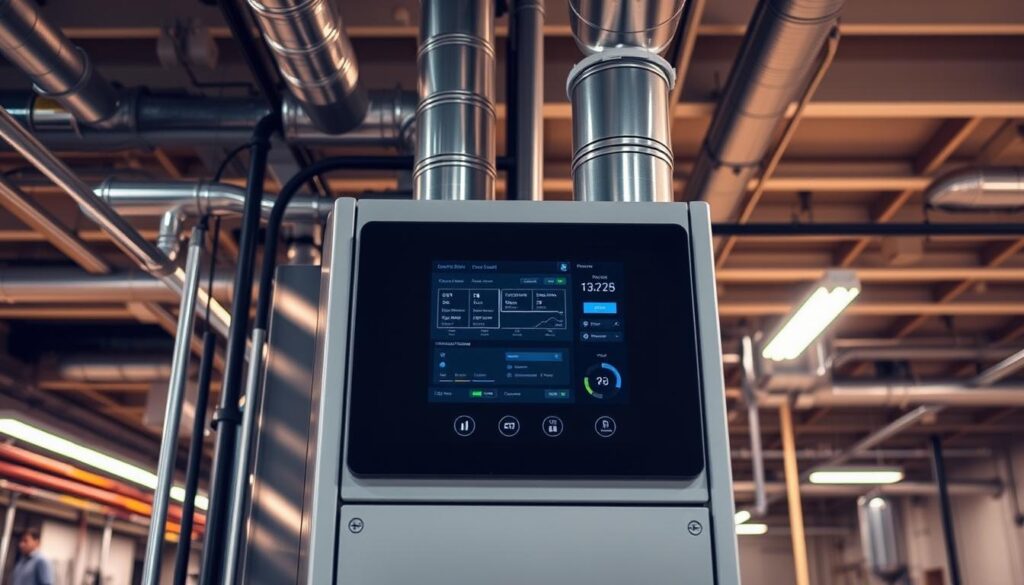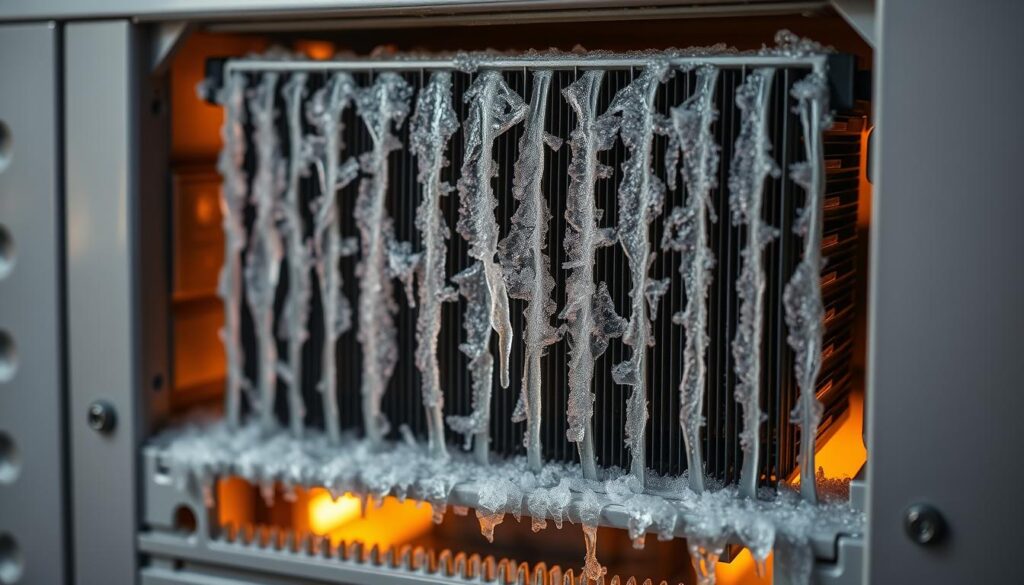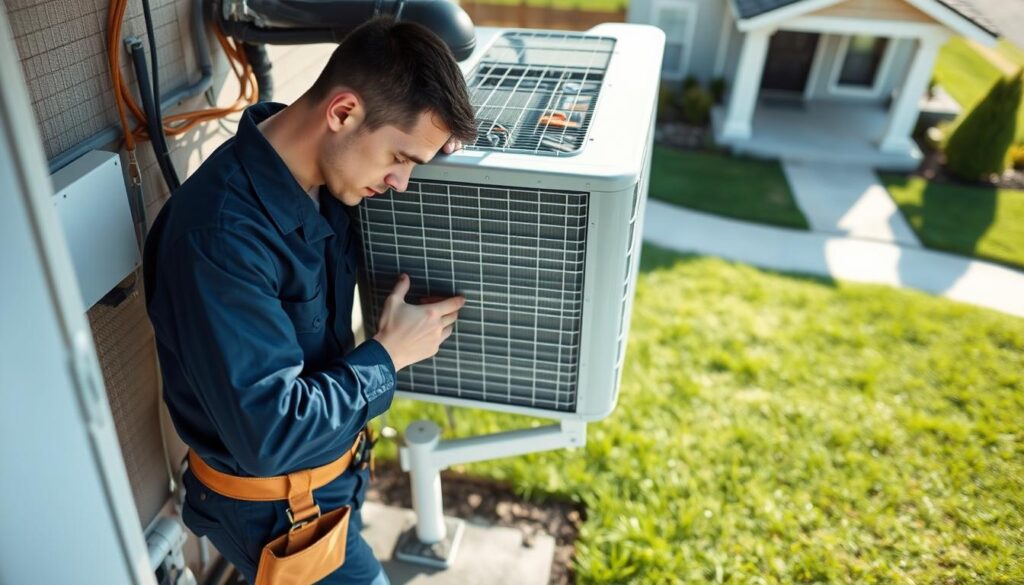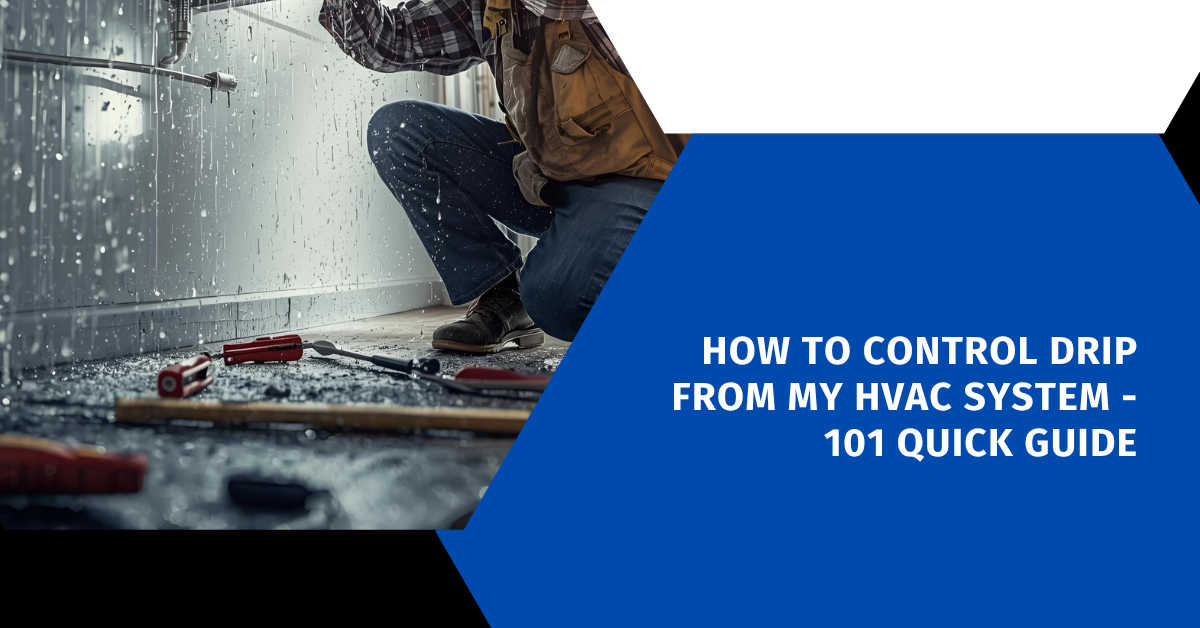Affiliate Disclosure
HVAC Guide Guys is a participant in the Amazon Services LLC Associates Program, an affiliate advertising program designed to provide a means for sites to earn advertising fees by advertising and linking to Amazon.
How to Control Drip From My HVAC System? Ever seen water gather around your air conditioner? Knowing how to manage drip from your HVAC system can prevent water damage and expensive fixes.

Your HVAC system makes condensation when it cools. It’s key to handle this water to keep your system running well and avoid damage to your home. If water can’t drain right, it might cause mold, harm your home’s structure, or break your system.
This guide will show you how to handle your HVAC system’s water drainage. This way, your unit works well, and your home stays safe.
Key Takeaways
- Understand the basics of HVAC condensate drainage
- Learn to identify potential drainage problems early
- Recognize warning signs of water leakage
- Discover simple maintenance techniques
- Prevent costly water damage to your home
Table of Contents
Understanding Why Your HVAC System Drips
Your air conditioner does more than cool your home. It also manages moisture. When it works, it removes heat and moisture from the air. This is why your air conditioner might drip water.
The air conditioner’s main job is to take heat and humidity out of the air. Warm air meets cold coils, and moisture turns into water droplets. This is a normal and expected process in managing HVAC moisture problems.
Normal Condensation vs Problematic Dripping
Not all dripping is a problem. Here’s how to tell if it’s normal or not:
- Normal condensation follows a predictable path through the drain line
- Water should be clear and consistent
- Drainage occurs steadily during cooling cycles
The Role of Moisture in HVAC Operation
Removing moisture is key for your air conditioner’s work. When it manages humidity well, it:
- Prevents mold growth
- Reduces indoor humidity levels
- Improves overall air quality
Impact on Indoor Air Quality
Too much moisture can harm indoor air quality. If your HVAC system doesn’t work right, it can lead to:
- Bacterial growth
- Allergen buildup
- Respiratory problems
Proper moisture management is key to maintaining a healthy, comfortable home environment.
Explore Our HVAC Shop
Looking for top-rated HVAC tools, parts, and accessories? Visit our shop and find the perfect solution for your needs.
Visit the ShopCommon Causes of HVAC Water Leakage
Knowing why your central air unit drips can save you money and prevent damage. Water leaks in HVAC systems are more than just a nuisance. They often signal a problem with your cooling system.
To fix HVAC leaking water, it’s key to find the main causes. Here are the top reasons for water drainage issues:
- Clogged Condensate Drain Lines
- Dirty Air Filters
- Low Refrigerant Levels
- Damaged Drain Pans
- Frozen Evaporator Coils
Now, let’s explore these common problems:
| Cause | Potential Impact | Recommended Action |
|---|---|---|
| Clogged Drain Lines | Water backup and system inefficiency | Professional cleaning or DIY maintenance |
| Dirty Air Filters | Reduced airflow and cooling performance | Regular filter replacement |
| Low Refrigerant | Ice formation on evaporator coils | Professional refrigerant recharge |
| Damaged Drain Pan | Water leakage and potential water damage | Pan replacement or repair |
| Frozen Evaporator Coils | Complete system shutdown | Diagnose and resolve underlying issues |
“Catching water leakage early can prevent significant damage to your HVAC system and home infrastructure.” – HVAC Maintenance Experts
By recognizing these common causes, you can take steps to keep your central air unit in good shape. This helps prevent major water damage.
Explore Our HVAC Shop
Looking for top-rated HVAC tools, parts, and accessories? Visit our shop and find the perfect solution for your needs.
Visit the ShopHow to Control Drip From My HVAC System
Water leaks from your HVAC system can be a big problem. They can damage your home. It’s important to know how to stop these drips to keep your cooling system working right.
Immediate Actions to Take
Seeing water or condensation from your air conditioner? You need to act fast. This can stop more damage from happening.
- Turn off your HVAC system immediately
- Mop up standing water to prevent floor damage
- Place a bucket under the drip to catch excess water
- Clear the area around the unit to prevent water spread
Safety Precautions During Inspection
Before you start looking for the leak, make sure you’re safe:
- Ensure electrical power is completely shut off
- Wear protective gloves and safety glasses
- Use a flashlight to inspect dark areas
- Avoid touching electrical components
Tools and Materials Needed
Here’s what you’ll need for basic troubleshooting:
- Wet/dry vacuum
- Pipe cleaning brush
- Plastic drain pan
- Protective towels or rags
- Condensate drain line cleaner
These steps can help with small problems. But, if the dripping doesn’t stop, you might need a pro. Always call a certified HVAC technician if you’re unsure.
Addressing Clogged Condensate Drain Lines
Clogged condensate drain lines can cause big problems for your HVAC system. It’s important to know how to maintain your ac drain line. This helps prevent water damage and keeps your system working well.
If your hvac condensate drainage system gets blocked, water can leak into your home. Spotting the signs of a clogged drain line early can save you from expensive repairs.
- Watch for water pooling around your indoor HVAC unit
- Listen for unusual gurgling sounds in the drain line
- Check for musty odors near the air conditioning system
To clean a clogged drain line, you’ll need some basic tools:
- Wet/dry vacuum
- White vinegar
- Protective gloves
- Pipe cleaning brush
“Regular maintenance is the key to preventing drain line issues and extending your HVAC system’s life.” – HVAC Maintenance Experts
Here’s how to clean your ac drain line:
| Step | Action | Purpose |
|---|---|---|
| 1 | Turn off HVAC system | Ensure safety during cleaning |
| 2 | Locate drain line access point | Identify primary cleaning location |
| 3 | Use wet/dry vacuum to remove blockage | Clear initial debris and buildup |
| 4 | Flush with vinegar solution | Eliminate bacterial growth |
Pro tip: Do this maintenance every three to four months. It keeps your hvac condensate drainage system working great.
Explore Our HVAC Shop
Looking for top-rated HVAC tools, parts, and accessories? Visit our shop and find the perfect solution for your needs.
Visit the ShopMaintaining Your HVAC Air Filters
Air filters are key in stopping hvac water overflow and preventing air conditioning condensation. Keeping your HVAC system in top shape depends on regular filter care. This can save you money and make your indoor air cleaner.
Looking after your air filters is more than a simple task. It’s essential for your HVAC system’s efficiency and stopping water leaks.
Selecting the Right Air Filter
Choosing the right air filter involves several important factors:
- MERV rating (Minimum Efficiency Reporting Value)
- Filter material composition
- Size compatibility with your HVAC system
- Specific air quality needs of your home
Replacement Frequency Guidelines
The Department of Energy suggests specific replacement times:
| Filter Type | Replacement Frequency | Recommended For |
|---|---|---|
| Fiberglass Filters | Every 30 days | Basic protection |
| Pleated Filters | Every 90 days | Better air filtration |
| High-Efficiency Filters | Every 6-12 months | Allergy sufferers |
Impact on System Performance
Clean air filters boost your HVAC system’s efficiency. Clogged filters make your system work harder, leading to more energy use and less cooling.
“A clean filter is the simplest and most effective way to maintain your HVAC system’s health.” – HVAC Maintenance Experts
Regular filter care stops condensation, reduces system strain, and extends your HVAC’s life.
Dealing with Frozen Evaporator Coils

Frozen evaporator coils can really mess up your central air unit. When ice forms on the coils, it stops the cooling process. This can lead to a lot of water leaking.
Several things can cause the coils to freeze:
- Restricted airflow through air filters
- Low refrigerant levels
- Malfunctioning blower motors
- Blocked return air vents
To fix the water leak from frozen coils, you need to act fast. First, turn off your air conditioning system. This stops more damage and lets the ice melt on its own.
“Prevention is always better than cure when it comes to HVAC maintenance.” – HVAC Expert
If you see the coils freezing often, check your air filters. Dirty or clogged filters block airflow, leading to fast freezing. Make sure to change filters often and keep your HVAC area well-ventilated.
Getting professional help can find and fix the root cause of the problem. A skilled technician can check refrigerant levels, look at electrical parts, and suggest ways to stop water leaks for good.
Explore Our HVAC Shop
Looking for top-rated HVAC tools, parts, and accessories? Visit our shop and find the perfect solution for your needs.
Visit the ShopInspecting and Replacing Damaged Drain Pans
Your HVAC system’s drain pan is key in managing water overflow. Over time, these parts can wear out, leading to water damage in your home.
Drain pans catch the condensation from your air conditioning. If they get damaged, it’s important to maintain your ac drain line to avoid leaks and damage.
Signs of Wear and Damage
Spotting drain pan problems early can save you money. Watch for these signs:
- Visible cracks or fractures
- Rust or corrosion
- Water stains around the HVAC unit
- Unusual moisture buildup
Replacement Options
If your drain pan is badly damaged, it’s time to replace it. Modern drain pans are made from materials like aluminum or plastic that resist rust. You have a few choices:
- Direct manufacturer replacements
- Universal drain pans
- Custom-fitted solutions
Professional Installation Tips
While some try DIY, getting a pro to install is safer. A certified HVAC technician can:
- Accurately measure your system’s dimensions
- Ensure proper sealing
- Check for additional system issues
- Recommend the best replacement option
Protect your home by addressing drain pan issues promptly and professionally.
The Role of Proper Insulation
Proper insulation is key to stopping condensation from air conditioning and managing moisture problems. Your home’s insulation keeps temperature changes from causing moisture buildup.
Knowing how insulation works helps protect your HVAC system from water damage. When your walls, attic, and other spaces are well-insulated, you create a stable environment. This environment minimizes temperature differences that cause condensation.
- Reduce heat transfer between indoor and outdoor spaces
- Prevent moisture accumulation in critical HVAC areas
- Improve overall system efficiency
- Lower the risk of water leaks and damage
Focus on these key areas for effective insulation:
- Attic insulation to prevent heat buildup
- Wall cavity insulation for temperature regulation
- Sealing potential air leak points
- Checking insulation quality around ductwork
Professional energy audits can spot weak spots in your home’s insulation. By investing in proper insulation, you’ll stop condensation and boost your HVAC system’s performance and life.
Professional Maintenance Requirements
Keeping your HVAC system in top shape is key. The Air Conditioning Contractors of America (ACCA) says regular check-ups can make your system last longer. They also help avoid costly problems with hvac condensate drainage.

Annual Service Checklist
Getting a full annual service is crucial. It helps catch and fix hvac leaking water early. Here’s what pros usually do:
- Inspect condensate drain lines for blockages
- Check refrigerant levels
- Clean evaporator and condenser coils
- Test electrical connections
- Evaluate system efficiency
When to Call an Expert
Some HVAC problems need quick expert help. Call a certified tech if you see:
- Persistent water leaks
- Unusual system noises
- Inconsistent cooling performance
- Frequent system cycling
- Unexplained energy bill increases
Cost Considerations
Professional maintenance might seem pricey at first. But it saves you money in the long run. Annual service can cut repair costs by up to 40%. Most maintenance plans cost between $150 and $300. That’s much less than what emergency repairs cost.
Regular maintenance is not an expense, but an investment in your HVAC system’s longevity and performance.
Prevention Tips for Long-term Protection
To stop condensation from air conditioning, you need to take care of your HVAC system. Keeping it in good shape means regular maintenance and paying attention to small details. Knowing how to manage drip from your HVAC system can avoid expensive fixes and water damage.
Here are some key steps to prevent problems:
- Schedule quarterly professional inspections to catch potential issues early
- Replace air filters every 60-90 days to ensure optimal airflow
- Keep indoor humidity levels between 30-50% using a dehumidifier
- Clear surrounding vegetation from outdoor HVAC units
- Maintain consistent thermostat settings
“Preventative maintenance is always cheaper than emergency repairs.” – HVAC Professional Insight
Regular upkeep stops condensation and keeps your HVAC system running well. Check your drain lines every month for clogs. Use a wet/dry vacuum or a special cleaning solution to clear blockages that might cause leaks.
Your home’s insulation is also key in stopping HVAC condensation. Proper insulation around windows, doors, and ducts keeps moisture out and temperature steady.
- Inspect weatherstripping annually
- Seal any visible gaps in home infrastructure
- Ensure proper attic and wall insulation
Following these tips will keep your HVAC system safe from damage and ensure your home stays comfortable and energy-efficient.
Explore Our HVAC Shop
Looking for top-rated HVAC tools, parts, and accessories? Visit our shop and find the perfect solution for your needs.
Visit the ShopWarning Signs of Serious HVAC Issues
Your central air unit dripping water might be more than a simple nuisance. Spotting serious HVAC problems early can prevent expensive repairs and system failure. Homeowners should watch for specific warning signs that mean your air conditioning system needs a pro’s help.
Some key signs mean your HVAC system needs a quick check:
- Unusual loud or grinding noises during operation
- Persistent musty or burning odors
- Inconsistent cooling throughout your home
- Visible water leaks around the air conditioner dripping water
- Frequent system cycling or unexpected shutdowns
Ignoring these warning signs can lead to more extensive damage and expensive repairs. If your central air unit keeps dripping or you see many symptoms, call a professional HVAC technician right away.
“Early detection of HVAC issues can prevent complete system breakdown and save significant repair costs.” – HVAC Professional Maintenance Guide
Be careful with water-related problems. Too much condensation, puddles near your unit, or unexplained moisture can mean big issues with your air conditioning system’s drainage or parts.
Regular maintenance and quick professional help are your best defense against HVAC system failures. Don’t wait until a small problem turns into a big expense.
Conclusion
Managing your HVAC system’s moisture problems needs constant attention and smart strategies. Knowing how to control drip from your HVAC system helps avoid water damage. It also keeps your system running well. Regular maintenance is key to preventing problems before they happen.
Start your journey to manage HVAC moisture problems with knowledge and regular care. Simple steps like checking condensate drain lines and replacing air filters help a lot. Also, watching your system’s performance can cut down on unexpected water leaks.
Professional annual inspections add extra protection. They make sure your system works efficiently and stays free from moisture issues.
While some maintenance tasks are easy, knowing when to get professional help is important. Issues like frozen evaporator coils or constant drainage problems need experts. Spending time and money on your HVAC system’s health saves you from expensive repairs and breakdowns later.
A well-kept HVAC system is your best defense against moisture problems. Stay alert, follow maintenance tips, and ask HVAC pros when unsure. Your comfort and your system’s long life depend on your proactive moisture management.

